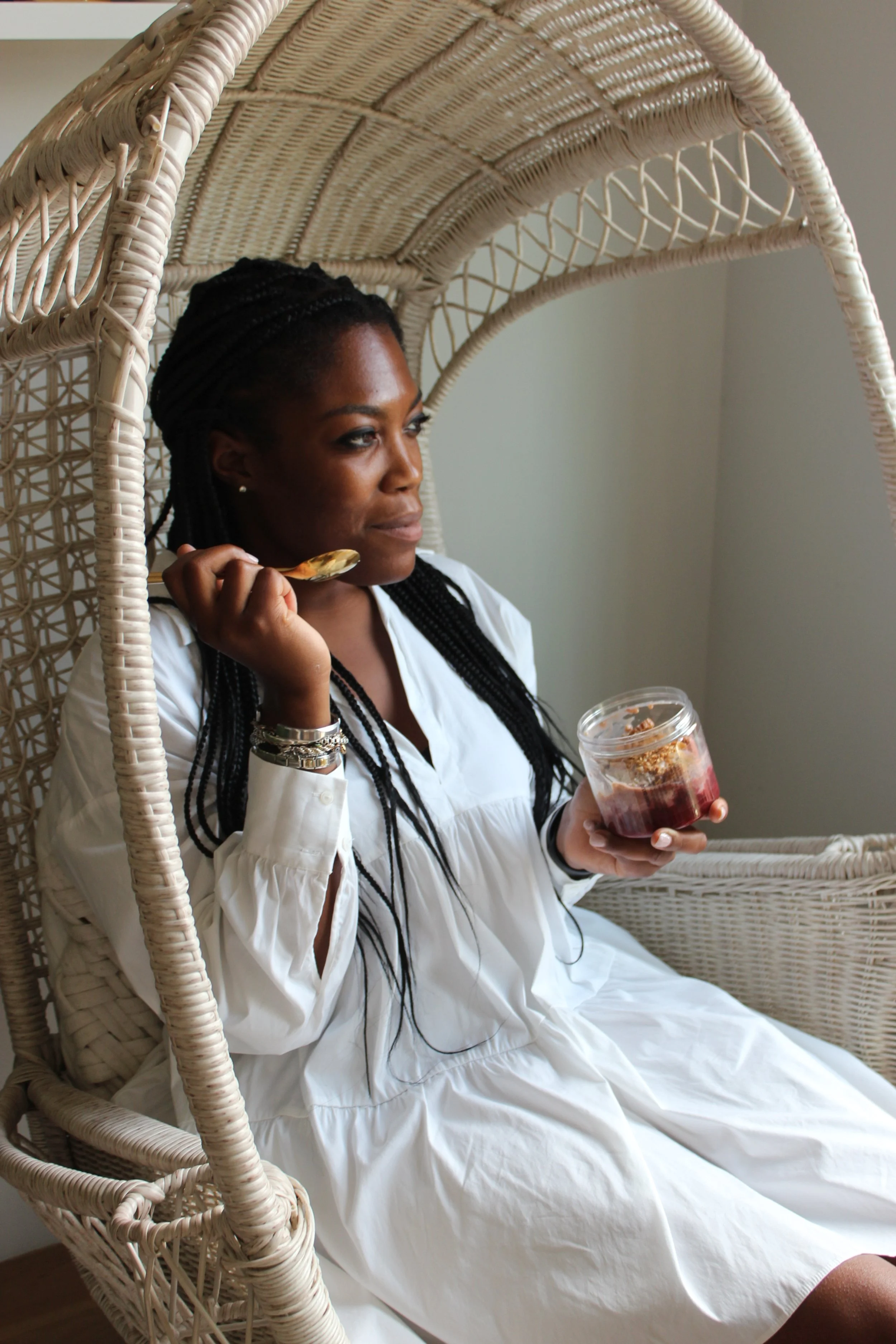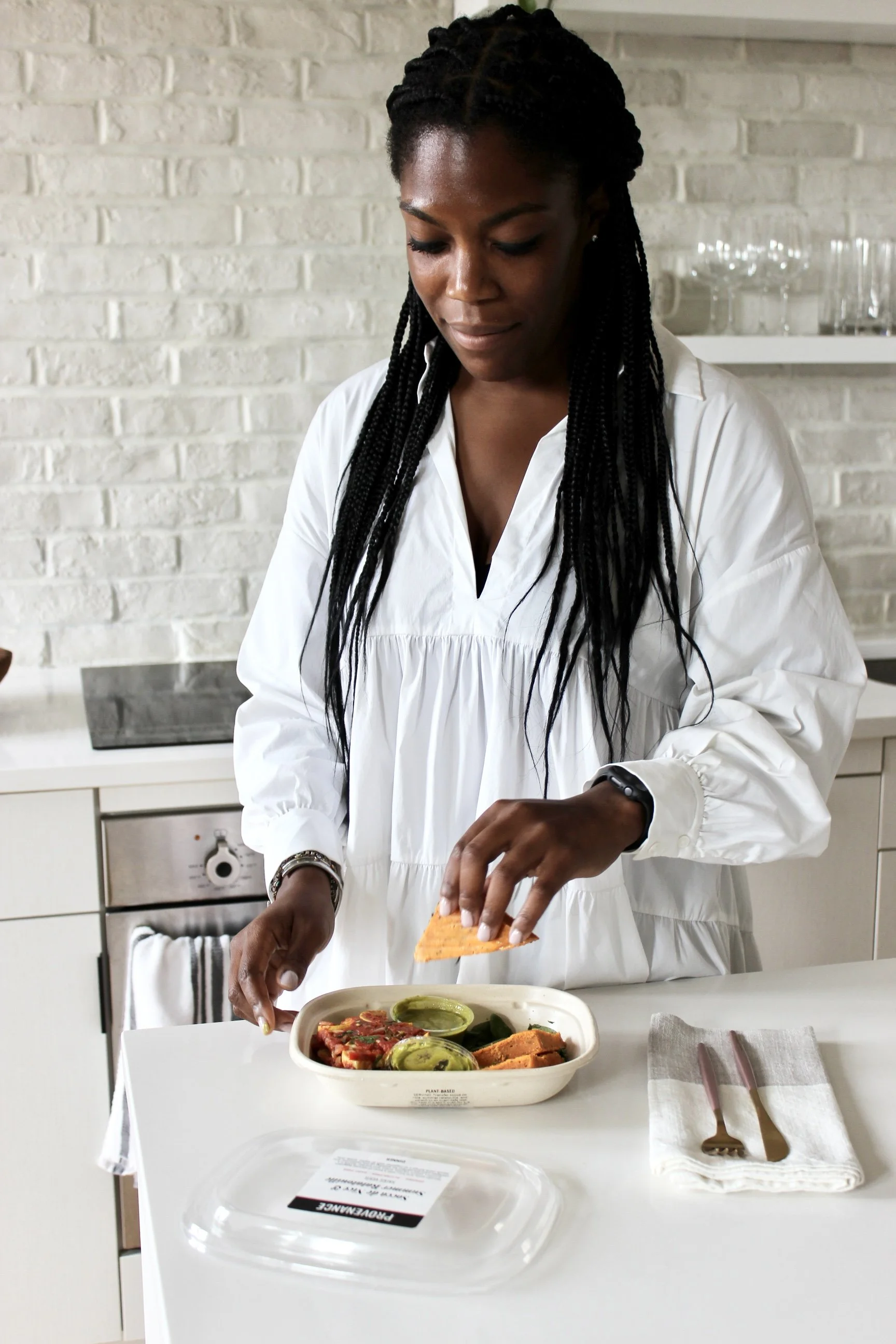Food as medicine is a term you often hear from the Provenance team, and with good reason. While your diet can either exacerbate or alleviate symptoms of conditions or illnesses, food is our favorite way to help heal our minds and bodies.
Meet Ku Adofo-Mensah, a Senior Digital Design Strategist in New York and dedicated Provenance client who eats with us to help reduce endometriosis flare-ups. After years of discomfort and having her symptoms consistently misdiagnosed, she shares her “aha” moment and how she has finally taken control of her condition.
What was the process of your being diagnosed?
The process was long and arduous - over 20 years of trial and error. Going to countless doctors, seeking answers only to be met with misdiagnosis, failed treatments, and increased frustration with our medical system. It wasn’t until a close friend, who happens to be a psychiatrist, mentioned endometriosis to me in 2020 that I started seeking a diagnosis. Unfortunately, the only way to diagnose endometriosis is through laparoscopic surgery and the path is confusing and prohibitive for many. After many attempts with local doctors, I sought the care of a specialist at the Cleveland Clinic where my endometriosis suspicions were not only acknowledged but validated. I was officially diagnosed in May 2021.
What is endometriosis?
Endometriosis is a condition where tissue similar to the kind that lines the inside of the uterus grows outside of the uterus as well, causing pain and discomfort among other symptoms. According to Johns Hopkins medicine, it affects 2 to 10 percent of women in the US who are of childbearing age.
Over the course of your endometriosis journey, what has been the most valuable lesson you learned about your health?
“No one knows my body better than me so when something feels like it’s not right, it’s usually not. In moments of suffering and frustration, it is easy to give up or accept what’s in front of you even if it doesn’t feel like the best option.”
I would definitely say the biggest lesson is trusting my gut and following my instinct. I’ve had so many practitioners write my symptoms off telling me it was all in my head, only to find out months or years later that there was in fact something wrong and it wasn’t in my head. If it wasn’t for my instinct (and stubbornness) I would have never sought out diagnosis.
How has nutrition influenced your experience with endometriosis and overall health? Do certain foods trigger flare-ups? Have certain foods helped alleviate symptoms?
Food has always played a major role with my endometriosis and overall health and I was in denial about it for years because I didn’t want to give up one of the few joys I had. In my teens and early 20s, doctors sent me to countless nutritionists to help manage my weight and hormone imbalances, but the antiquated and blanketed approaches never worked and, as a result, never stuck for me.
Eventually I hit a wall with food and in addition to feeling like garbage, I was literally existing off of oatmeal and soup to mitigate many of the adverse symptoms I was experiencing. It wasn’t until I started exploring integrated medicine and gut health a few years ago that my understanding and relationship with nutrition (that works best for me) changed.
Over the years, I’ve come to learn and accept that certain foods like meat, dairy, gluten and certain complex carbohydrates, not only affect my hormones and how I'm feeling but also contribute to my inflammation - especially during my ovulation, luteal and menstrual phases.
I have found that by following an 80% gluten-free, plant based, anti-inflammatory diet, I can alleviate some of my endometriosis symptoms. Within that, I also infuse my meals with lots of fiber and probiotics whenever possible. Given all of my dietary considerations, Provenance has been a lifeline and a worthy investment in my health journey. It provides me access to the nutrients I need, without tasting like cardboard or feeling like I am eating twigs and berries.
“Given all of my dietary considerations, Provenance has been a lifeline and a worthy investment in my health journey. It provides me access to the nutrients I need, without tasting like cardboard or feeling like I am eating twigs and berries.”
Ku’s favorite Provenance offering is Daily Essentials Meal Delivery.
What are some non-negotiables in your self-care?
The biggest non-negotiable for me is slowing down and putting myself first. I used to run around and do the most, filling my days to the brim and barely sleeping at night. Now it brings me peace to miss out on things, set boundaries and say no.
Some other non-negotiables are some daily form of movement, whether it is yoga, strength training or spinning, so I can get my heart rate up and blood flowing. It always requires me having to give myself a pep talk, but I don’t regret it afterwards. Bi-weekly therapy and acupuncture sessions help situate my nervous system and allow me to ground myself. Per the recommendation of my functional medicine doctor, I also purchased an infrared sauna blanket a few months ago, and that had been an essential resource in my self-care toolkit. I use it every evening before bed to aid my body in detoxification and it has been a game-changer in helping reduce my insomnia, allowing me to get quality sleep, which is something I have struggled with for years.
How has Provenance helped you take control of your health/endometriosis?
Provenance has solved a big pain-point for me over the past two years, fueling my body with a convenient variety of nourishing (and tasty), nutrient-dense meals and snacks. I’ve battled hormonal imbalances for over 20 years and with that comes extreme fatigue, brain fog, inflammation and cravings. Although I enjoy cooking, I’ve always struggled to prioritize continuously cooking whole meals with my limited energy and extreme hormonal fluctuations. During the pandemic when my symptoms became extremely unmanageable, despite cooking all of my own meals, I quickly realized that I needed to get serious and focus on committing to a plant-based, anti-inflammatory diet, in an effort to self-soothe the chaos in my body.
As someone who lives alone and can sustain herself on random snacking, Provenance’s meal delivery and cleanse programs literally saved me. They have provided me with clean sources of plant-based fuel while removing the thinking and stress out of meal preparation for myself. Not to mention, I have the craziest taste buds and the most random cravings. I appreciate the variety in dishes and genres that Provenance provides me, and it is all delicious. Most importantly, my body responds really well to the food, and it’s one less thing to worry about in my day-to-day management of endometriosis.







